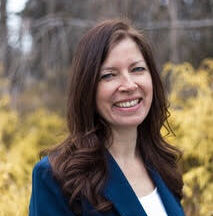I started seminary in the early 1990’s, the decade when the Synods of the Christian Reformed Church debated whether women could serve in the office of elder and minister.
The debate itself and conclusions of Synod 1995 for a local option would rip apart families, Christian schools, and congregations, and eventually lead to the formation of a new denomination — the United Reformed Churches in North America.
I remember watching the debates on the floor of Synod with no small amount of horror, the pain of those who spoke and those who didn’t speak was palpable. As a woman seeking ordination, I felt both a sense of relief, but also, the weight of the fallout on my shoulders when the decision was finally ratified in 1995.
Not surprisingly, those for and those against women in office both claimed to have the Bible on their side, pointing to various texts or themes or trajectories to prove their point. Even at the time, I remember wondering how one group of people who both claim to love Jesus and to be seeking God’s will could come to such vastly different readings and opposing conclusions about what the biblical text says. Was it true that those who were against women in office exhibited a high view of the authority of Scripture whereas those who were for women in office failed to take Scripture seriously?

Last week, I mentioned that my blog posts for the Sundays in August would explore the writings and insights of Walter Brueggemann, a widely-respected biblical scholar and preacher by Christians across the theological spectrum. While Brueggemann never took up the issue of women in ministry in his writings (to my knowledge), he did have a lot to say about Christian’s engagement with Scripture.
As it turns out, Brueggemann was convinced that neither (theologically) liberal nor conservative Christians take the Bible seriously. Conservatives, he noted frequently, domesticate the Bible into theological clichés and prioritize doctrinal purity over the emancipatory nature of the gospel. Liberals strip the Bible of its contemporary relevance by expending all their interpretive energy on historical-critical rabbit holes. Both fail by reducing the Bible to something we manage and control.
I confess I’m fascinated by Brueggemann’s assessment. Part of the reason we come to such completely different conclusions about how Scripture speaks on various topics is that we are using the Bible in ways it wasn’t intended. And because of that, we are missing the radical liberating invitation of the gospel. What Brueggemann suggests by contrast is that Christians of all stripes need to immerse themselves more deeply into the narrative world of the Bible and to allow its counter-world to interpret, inform, and transform our way of inhabiting the world.

While Brueggemann regularly alludes to this counter world, this alternative frame of reference that Scripture invites us to inhabit, one of my favorite articulations is in his book, From Whom No Secrets are Hid. Focusing his attention on the psalms but certainly applicable to all of Scripture, Brueggemann describes the world we find there as:
- A world not of anxiety and fear but of trusted fidelity. A world where we trust the abundance of the world God created and live in dependence on God’s covenant faithfulness in such a way that we are not constantly worried about “not having enough, not having done enough, not measuring up . . . “ (p. 10). “The Lord is our light and our salvation. Whom shall we fear?” (Psalm 27:1)
- A world not of greed but of generosity. A world in which we need not hoard resources and wealth out of fear of not having enough but instead, can be generous with what we have because we know all that we have are gifts from God.
- A world not of denial but truth-telling. A world where, instead of trying to anesthetize our shame and bury our guilt, we name, acknowledge, lament, and grieve the cracks and fissures in our lives and in our world that remind us that not all is well. Where we name our failures and confess that we don’t have all the answers. That in fact, we need God.
- A world not of despair but hope. That as dark and troubling as things may get, we live with the confidence that this is not the end of the story, that evil will not win, that God is still active in the world, and that Christ’s resurrection is the promise that God can transform even the most dire situations into new life.
- A world of shared norms. A world with a shared understanding of what is good and right and decent and appropriate such that even if we don’t always practice it, we recognize good for good and evil for evil.
Brueggemann has more, but this gives you an idea of where he is going. What I’m drawn to is Brueggemann’s conviction that God wants so much more for us than the closely-held assumptions that shape our living. And that instead of using the Bible as a weapon against others, the biblical narrative invites us to experience renewal and transformation ourselves, to be swept up in the profound goodness of the gospel.

For Brueggemann, God never intended life to be a zero-sum game where some win and some lose, some eat and some starve, some control and some are controlled, some are in and some are out. Human beings created that world. As disciples of Jesus, we are invited to live out a different frame of reference rooted in the conviction that God is an active presence in our world, that God’s steadfast love never ceases. And in response to God’s covenant faithfulness, we are then called to live out radical discipleship and covenant obedience not through the exercise of control, but the outpouring of love for others.
What a beautiful witness to the goodness of gospel! They will know we are Christians by our love.
Feast photo by Priscilla Du Preez 🇨🇦 on Unsplash
Paradise sign photo by Bernard Hermant on Unsplash


6 Responses
Thank you. Concise, complete, liberating. Direct. Two thoughts: First, till two generations ago, Dutch Reformed families (both RCA and CRC) patiently read through the Bible every night at the dinner table (the dinner table!). I wonder how many of the New Right experience the Bible in that organic way? Second: the Daily Office leads one through great quantities of the Bible, especially the Psalms, in a quiet, devotional, non-debating way, yes, into “the world” that you and Brueggemann write of. With the demise of the family dinner table, our tradition has no equivalent. And a “Bible Study” is a whole different thing. The Bible is barely alive in our circles.
Wow. Thank you. How liberating!
A remarkable summary of WB’s core themes and one that is not only explanatory but winsome and compelling. Thanks you!
Keep writing Amanda. It’s encouraging stuff.
Excellent summary! I appreciate your continued reflections on WB’s insights. He may not have written much about women’s role in ministry but his memorial service says it all — two women officiants and a woman preacher! Regarding the counter world of the Bible, I cannot help but make a plug for Karl Barth’s essay “The Strange New World in the Bible.” I believe that WB’s entire career flowed out of that brilliant essay.
Thank you so much for these insights!! I love it! And thank you for dedicating these posts to my friend, Walter Brueggemann. I have been his reader for ages (think “The Prophetic Imagination”) But Judy and I met Tia and Walter at our weekly jazz gig in the mid 20-teens–in northern Michigan where both us had retired from distant ends of the country to be “near family.” (How could anyone miss that profile at the next table?!…no surprise, people of our ilk found jazz inspiring.) What a gift in our “old age!” What a privilege to dialogue with this scholar! (“Read it again,
Stan–in Hebrew if you want.”)
Our ministry has been with, and on behalf of, the historically oppressed–even in our campus years at UC-Boulder, but especially in the decades absorbed into the African American community and politics of South-Central Los Angeles. Walter’s insistence that the Biblical story begins with the exodus (the paradigm of Gospel in Black Christianity) put fire in my bones. And now, I could talk all this through with him! (Tia and Judy are no strangers to this endeavor either.)
Forgive me for sharing these convictions on your post—just a summary to maybe add further to your challenges. For those who want a very readable version from Walter, his “short” 2-volume “Delivered from Empire” and “Delivered into Covenant” were published in 2021 (he called me on a hike to let me know). These are my thoughts…but not isolated from our conversations.
Suppose….
**Jahweh heard the cries of the oppressed…despite the fact that the cries were not directed at him. And may not have been all from Israel. (“Read it again, Stan…”)
** “The multitudes” who were freed with “Israel” were not (per modern evangelical [Reformed, too?] interpretations) “come-alongs” sneaking an opportunity to get away from Egypt. They were delivered by Jahweh. They were part of the journey, part of the story of Israel…show up often in the OT in the way they were treated by Israel…and nowhere, I think, as in the NT gospels’ accounts of the life of Jesus.
**There were not two tablets of the decalogue, dividing the commands between the way we are to treat God and the six devoted to how we treat each other (especially “our people.” There were two identical tablets with all ten commands, all of them about how, as the people of God, to stay dedicated to Jahweh and free from and never embracing EMPIRE. Torah was not about personal morals, but community of God-belonging. (Meredith Klein in “Treaty of the Great King” and “By Oath Consigned” shed light on this as well.)
**The history/prophecy/poetry/wisdom and other OT writings are filled with warnings/consequences of failure to “keep covenant.” The covenanted “People of God” were to be a community of those who refused the power of EMPIRE in all its forms…because they are to live as people of God.
**Reading the life and teachings of Jesus lead me to see him as the ultimate covenant keeper. He reclaimed covenant requirements and prophetic promises and warnings as his own. He constantly interacted with “the multitudes.” He taught daily in the Temple (I wish I could have been his student!) with the result that the religious enterprise wanted to kill him. Aw…surely not?
After my friends passing, and in reflecting on the journey of the denomination that once ordained me (CRCNA), I did the unthinkable once more–I read through the ecumenical creeds and those “confessions” that have supposedly kept us on path. A few observations….
****They feel bereft of the life and teachings of Jesus from the Gospels–focused on his divinity, nature, godhead, and the apparent implications of those.
****While both the Empire (in this case, Rome) and the religious/power enterprise are clearly the cause of his suffering and his ultimate political execution, in the creeds and confessions both are exonerated. It was God’s fault all along. Punishment for “our sins.” Not guilty–one by one–in the courtroom of God’s justice. And guess what…God planned this all along…he had you in mind from all eternity. (At least, we hope he did…)
****The EMPIRE wins!! You win! Me, too! Wealth and Power (corporate/political/racial) wins. Or, at least, they become mere hindrances to our personal faith journeys, not covenant enemies.
****The creation of the “covenant of works” with Adam and Eve (tell me it wasn’t a “Reformed” creation) was a stroke of genius. It reframes the entire Biblical story, all the way through the arrival of Jesus, as the story of individual salvation…it’s about you and me and heaven, not about a cry of the oppressed and a community called by God to never again embrace the EMPIRE’S tactics of scarcity/consumerism/control of the earth/wealth/power/individualism. By grace, you personally saved! You’re in the brand new Covenant of Grace! Special Grace! Also…discovered a little later, there’s “common” grace, which allows you to pick your flowers from any bed on earth–or, to participate in every aspect of EMPIRE, and pretty much embrace its standards of success…just don’t forget to contribute to your local congregation and Christian school.
****Nothing (well, almost nothing) has been more disconcerting than the rise over decades now of “church as enterprise”, embracing the values of empire to “do church.” The Gospel of Christ–branded, marketed,organized, funded, goaled. star-rated with all the trappings of corporate enterprise. Including, sadly,churches within oppressed communities crying out to a God with no name.
****Choices: Those creeds and confessions? Standards of what we must believe. Believe these things and someday you will be saved. Or another choice? Do you see him? Follow this Way and you will be the living saved now?
In my minds eye, I see a man. The man of covenant. I see his shadow, beaten and bent beneath a primitive wooden beam. I see him. Somehow, at the foot of the hill, another piece of primitive wood. I hear him. “That one’s yours…take it up and follow me…you’ll never regret it. EMPIRE loses…every time.”